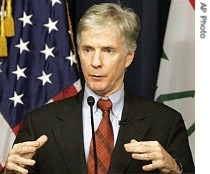2007年VOA标准英语-US, Iran, Iraq Setting Up Subcommittee on Iraqi(在线收听)
State Department
24 July 2007
U.S. and Iranian diplomats, meeting in Baghdad for the second time in two months, agreed Tuesday to set up a joint subcommittee with Iraq on Iraqi security issues. But U.S. ambassador to Iraq, Ryan Crocker, says the meeting with his Iranian counterpart was marred by heated exchanges over Iran's role in Iraq. VOA's David Gollust reports from the State Department.
Ambassador Crocker says Iranian support for radical militia elements in Iraq has, if anything, increased since his first meeting with his Iranian counterpart May 28.
But he says the United States has agreed to take part in a trilateral security subcommittee as part of an effort to determine whether Iran intends to match its expressed interest in a stable Iraq with tangible action.
Crocker spoke to State Department reporters in a telephone conference call after the seven hour meeting with Iranian ambassador to Baghdad Hassan Kazemi Qomi and senior Iraqi officials.
He described the discussions as difficult and marked by heated exchanges, starting when he accused Iran of continued, and even increased support, including weapons assistance, for extremists involved in attacks against U.S. and Iraqi forces.
 |
| US Ambassador to Iraq Ryan C. Crocker speaks during a press conference after meeting with the Iranian Ambassador Hasan Kazemi Qomi in Baghdad, Iraq, 24 July 24, 2007 |
Asked for details of the activity, which Iran denies, Crocker cited an increase in mortar and other indirect fire in the last month or two into Baghdad's fortified Green Zone, which includes the U.S. embassy and Iraqi government buildings.
He said the overwhelming majority of the attacks are coming from the Shiite Sadr City neighborhood and staged by militia groups, which the United States knows Iran has connections with.
He also said, under questioning, that the Bush administration is not going to abandon the dialogue with Iran at what he termed this early stage, though stressing that U.S. officials are not overly-hopeful of a change in Iranian behavior:
"Somebody said once that hope is a nice sentiment, but a pretty poor policy," he added. "We'll see what they do. Over the last two months, we've seen if anything an increase. They maintain they're serious about assisting Iraq to improve security and stability, so the opportunity's in front of them. We'll measure it by actions on the ground."
Crocker said he made no threats about consequences to Iran if its behavior does not change, other than to make it clear that officers of Iran's elite Quds Force and their surrogates will not be safe in Iraq, something he said Tehran should know already.
He said discussions would begin immediately on the formation of the trilateral security subcommittee, which would report to the principals in the Baghdad discussions.
The ambassadorial talks in Baghdad are the first direct dialogue between the two countries since the break in diplomatic relations after Iran's Islamic revolution in 1979.